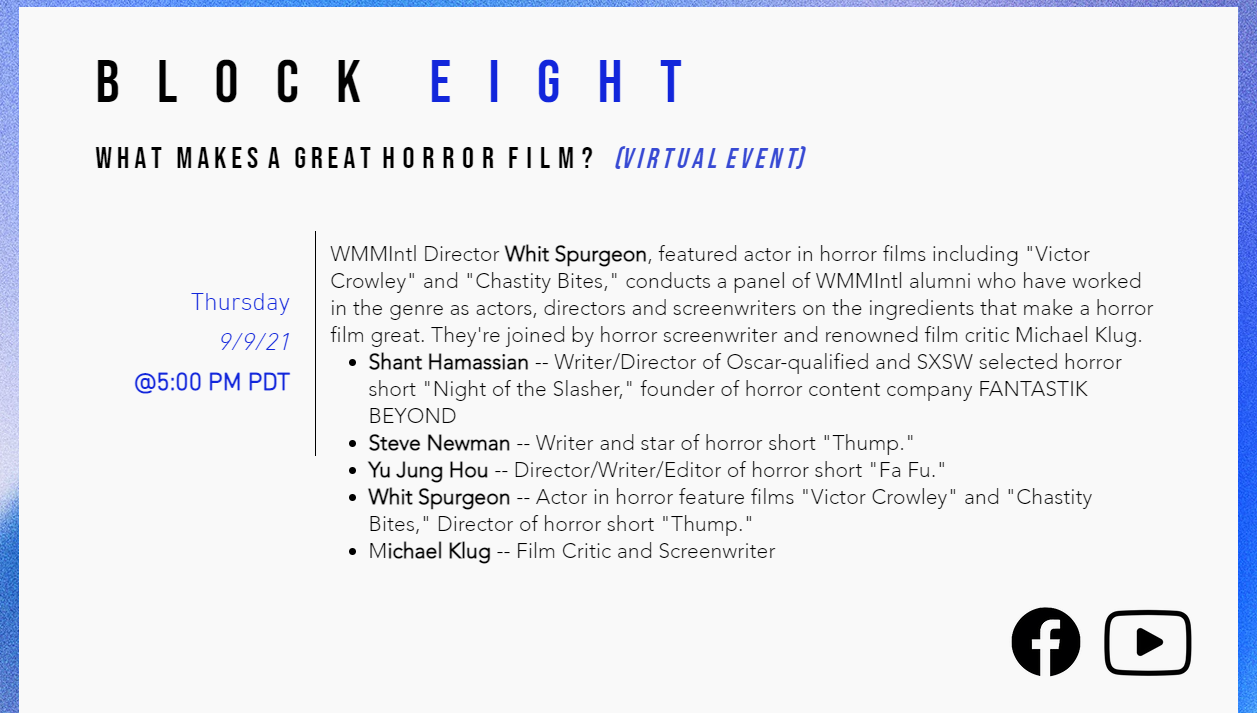 To have a seasoned and award-winning writer (with fifteen features under his belt) giving notes on your screenplay would be reason enough to hire Michael as a script consultant. But working with him goes so much further than that. His experience as a film critic, his genuine love for movies, as well as an incredible talent and work ethic, make his input and feedback invaluable. Sure, he will find errors, whether egregious or subtle and offer creative solutions. But beyond this, his ideas and insights elevate even the polished screenplay (the would be "final draft"), finding moments which will heighten drama, ways to further develop already intriguing characters, and little nuances that will separate your script from the stack. And he does all of this with a delicate brush, allowing the writer to maintain their own identity and creative vision. Daniel Alexander | Actor & Screenwriter
0 Comments
 As an actor who took up screenwriting (in part out of necessity), Michael's incredibly insightful notes have helped me see that I do have potential to excel in this lane of the entertainment business, while still having much to learn. Michael is a genuine person who loves cinema and that's the kind of person you want delving into the precious world you have created. He is firm, but fair, and wants only the best for your script. He provides straightforward, thorough, and thought-provoking critiques. His encouragement is as helpful as his dissection of every page, beat, and theme. To my delight (and possibly to Michael's dismay), I will return many times over for his expertise. I strongly implore anyone in need of a fresh pair of eyes and an open and honest mind to review their work - to Klugula Screenplay Consulting you must go! Candis Phlegm: Actor / Screenwriter  I'm always so grateful to folks who have used my services -- when they take a moment to pen a "wee testimonial" (thank you to Jurassic Park's John Hammond)... and today's kindness is no exception! Thank you to Ms. Katherine LaVictoire -- for trusting me with your script and letting KSC be a part of your screenwriting journey. And with no further delay, here are her very kind words: "Wow, what a resource! If you’re looking for detailed, helpful, honest (but supportive!) feedback for your screenplay, this is it. I’m still pretty new at this, and made a lot of formatting mistakes on my first feature screenplay, and Michael keyed in very quickly to what parts I was not understanding. He was able to explain what I was doing wrong and point out enough examples throughout the script that I actually learned the lesson! He taught me! Even though I can now write a flawless script (j/k, he’s not a wizard), I would be a fool to not use his services when I get to the top of the next screenwriting mountain. Formatting/general copywriting aside, he was able to make suggestions that strengthened my story, and which clarified and deepened my character choices. He expertly excavates a thousand tiny details to improve both the story and the way the screenplay itself will read. His perspective is communicated in an honest but gentle way that made me excited to tackle these incredibly productive re-writes. I cannot recommend Michael highly enough." Please join me and these other amazing folks, to discuss "What Makes a Great Horror Film?" It's a virtual event, part of the We Make Movies Int'l Film Festival this week.
Below is a link with all of the details. It's FREE and open to the public! https://www.wmmintlfilmfest.com/2021program  Way back when I was still in college, majoring in theatre, focusing on acting, a lesson brought up by one of my professors -- when prepping for the audition circuit -- was how best to attach your paper acting resume, to your 8x10 headshot. Do you glue it? Print the text directly onto the back of the photo? Use a paper-clip? Or do you staple it? Well, the discussion revolved around the idea that no matter how you did it, it was going to displease someone. Print it on the back and the casting person would have to flip it back and forth. Paper-clip it and the two items could eventually get separated. Staple it, and the casting person might poke their finger on an askew staple edge -- thus leaving a bad taste in their mouth about you as an actor -- regardless of your award-worthy audition. In other words, it's all subjective. Any number of issues out of your control could result in a "bad audition", at least from the casting person's perspective. And I was thinking of this lengthy anecdote when it comes to screenwriting. I'm all about the details -- certainly good for you as potential clients of Klugula Screenplay Consulting. But I believe that any screenwriter should be detail-oriented. I've found that when reading scripts (not ones which I've been hired to edit/analyze) with a lot of grammatical errors, typos or misspellings -- that such mistakes are unforgiveable. If you consider the piece "done" and send it out, with potential glaring problems (which are easy fixes) -- then you're sending it out with a "sharp-edged staple". Look, any potential financiers, contest readers or producers, will have a subjective reaction to your characters, their journeys and your plot. And your writing style. But if you are improperly formatted, with an onslaught of typos or other technical problems in your writing -- you're already handicapping your chances. You're inviting criticism and rejection, even if your high-concept story is Oscar-worthy. As part of my business, typos and the like, stick out like a sore thumb. I can't NOT see them. And I've got to assume that most readers are also going to be painfully aware of such mistakes. Yes, typos are possible, even for me -- but one teeny-tiny incorrect punctuation mark (while ultimately unacceptable) happens to the best of us, even on scripts which have already left our hands. And while those casting directors might have problems with the staple/paper-clip/glue choices you've made for that resume, you've done your best -- sending out your acting marketing materials with the best intentions, knowing that again -- it's now beyond your control. So before you send out your scripts to the "powers-that-be", do everything within your power to make it great. Why give anyone reading your work, an excuse as seemingly paltry or inconsequential (they're not) as an extra "c" in necessary? Let their choice to accept or reject your piece be based on things of substance. Speaking again from my personal experience while reading scripts -- there's a sort of "awww, that's too bad" reaction when I see too many easily-corrected technical gaffes. Perhaps it shouldn't, but when I see so many (not just one, which suggests an actual typo -- but a lack of attention to detail overall), I start to shut down. Yes, there are exceptions to every rule. Sometimes the script and story and characters are so darned engaging, that I begin to care less about consistent technical mistakes. Obviously, such a stance is not the case when I take on your script in a client/consultant relationship -- only an example of me as a casual reader. Bottom line, if you're not hiring someone to catch all of these mistakes, then you need to be the very best you can be on your work, before submitting it. Staples are open to interpretation, but being overly-conscious about the finer details in your script, is not. Don't like my story? Don't care for my main character? Fine. Hey, reader! You're not reading past page ten on my script because there are too many technical issues? Certainly possible, and who can blame them? Why short-change yourself?  So thrilled to have been a guest on Over & Under: Artists Exposed, with Chaz Campbell Evans. We discussed film in general, film criticism and took a deep dive into the screenwriting craft. A great conversation. I hope you'll take a listen! Thanks for the opportunity, Chaz! :)  'tis Cyber Monday (eve, that is), and here's the deal (the deal, get it?) Until midnight PST on December 1st, 2020, ALL services are 20% off! Got a short script needs some work? A feature screenplay aching for some insights? Or just want to throw around a few ideas? Check out the services and let's get to work!  It's never been a secret that writers use their characters and stories to sometimes take a deep dive into their own underlying problems, touchy issues and ugly neuroses. I've certainly done it for years. Using personal experiences might be for something as small as a basic character trait, an inspiration for a particular scene, or something larger -- a concept for an entire script. But therapy is sometimes just the name of the game when you're a writer. And why shouldn't it be? If you're a writer worth your salt, you'll pull from your own personal experiences, in some cases from the most outlandish ones. It's a great tool to have in your belt, and in some cases, there's simply no way around it. We are who we are, so why hide it, even in your writing? I realized, upon completion of my latest feature spec, BOYS, that my last three solo specs, each took the aforementioned "deep dive" into very personal territory, drudging up terrible memories to accommodate these new ideas and these very damaged characters. A script I completed last year, MOM DIED, marks the first in the trilogy. As the title might suggest, this truly tackled the strained relationships of a mother and her children. I unloaded a great deal of emotional baggage while writing this piece. Upon completion, I sent the script to my older brother for his thoughts. Indeed, he recognized many of the situations and moments described within -- with a combination of nostalgia and no doubt, mutual pain. I think some of the best scripts are those which focus so deeply on the characters. MOM DIED is a zombie film. But those grotesque and frightening moments are wholly incidental to the main focus of the script: dysfunctional family relationships. Second in the trilogy, TRIP, a Lovecraftian, uber-gay road trip movie. I completed that one in April of this year. It was inspired by the frequent road trips my husband and I take (well, we did before quarantine and the ongoing madness of this year). And I realized that a very unfortunate and deeply upsetting public encounter late last year (I won't impart details here), was the reason for this very blatantly "gay" story. I described TRIP early on as "unapologetically gay", via the characters, their situation and the very graphic sexual scenes within. While there's been no closure on this event from last year (it was very hurtful and devastating, and continues to linger about in my mind), I feel that TRIP was somewhat helpful in processing the ordeal, and letting go of some of the damaging negativity which came along with it. TRIP really is an example of "I'm as gay as the day is long, and I'm proud to shout it from the rooftops" type story. No doubt, this stance is in direct retaliation to last year's "event". And this year, I tackled BOYS. This ended up pulling heavily from my (non) relationship with my late biological father. He died late last year, and my interactions with him over the past 30 years could best be described as "less than minimal". My folks divorced when I was about 6 years old, and I believe the last time I actually saw my father in person, was when I was probably 8 or 9 years old. And the last time I spoke to him on the phone, was probably -- just a guess -- 15 years ago? BOYS really tackled the notion of father/son relationships, and how difficult and delicate they can be. In addition, this 13-year old main character, Mickey (a flimsily-hidden take on my own childhood moniker, "Mikey") is dealing with his homosexuality in the summer of 1982. It's a deeply masculine environment portrayed in the script (thus one of the reasons for the title "BOYS"). Even with all of the character development and eventual outside forces penetrating this small circle's "easy" lives, it all comes back to reconciliation and understanding between a father and his two young sons... something I sadly never got to experience. While the characters have some semblance of closure, I do not. Thus, the therapy -- albeit through fiction. Writing's a powerful tool, for so many reasons... In the case of all three of these scripts, there were uncountable moments during the crafting of each piece, where I had emotional breakdowns (and breakthroughs?) Many times, they would come up suddenly, and the tears would freely flow. If I needed confirmation that something was being triggered (and hopefully released to some extent), those tears while writing, were it. Now, certainly all of my scripts, even those I've been hired out for -- require deep dives of some kind. Life experiences are what make writing rich, organic and unique. These personal memories are the things which help to create and cement your own, distinct "voice". But these last three scripts in particular, have truly provided an emotional release for me, thus "The Therapy Trilogy". However, as I begin work on my latest solo piece, currently titled SAY UNCLE!, I'm realizing that this so-called "trilogy" will shortly become a "quadrilogy", as I investigate my relationships between myself and two of my late uncles, both of whom I was very close to. I guess as long as there are internal issues and heavy baggage to draw upon, I may as well take advantage of the pain, right? After all, these unique experiences are indeed mine. No one else will necessarily have these particularly awkward, painful or unbelievable memories to pull from. Similar perhaps, but not exact matches. I've often quoted Ray Bradbury with his brilliantly insightful comment, "You must stay drunk on writing, so reality cannot destroy you". And with this realization and acceptance of "The Therapy Trilogy" and its insights/releases, Bradbury's phrase is right on the money. Certainly easier (maybe not better) to face pain through the filter of a character or a piece of fiction. Bottom line? The therapy continues. Do you all find that you're able to offload painful thoughts and experiences, simply by committing them to the page? Sound off in the comments. Thanks for your time and for this additional bit of therapy. I've just completed my 13th feature spec, BOYS. And with that news, I'm offering (for a limited time only) 13% off of ALL SERVICES on the site! Want some feedback/editing/story assistance on your feature or short screenplays? I'm your guy. Deals end September 24th, 2020! Let's get to work! :)
|
newsStay up to date with screenwriting tips, sales on services, schedule changes and other important stuff at KSC! Archives
July 2024
Categories |





 RSS Feed
RSS Feed